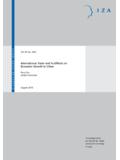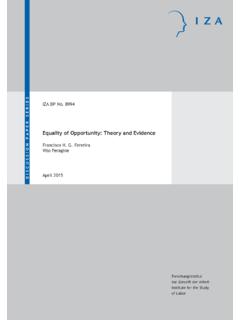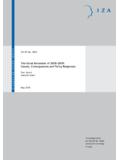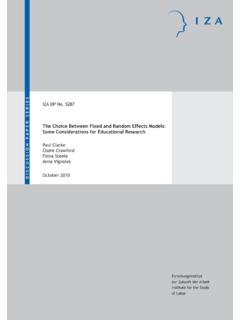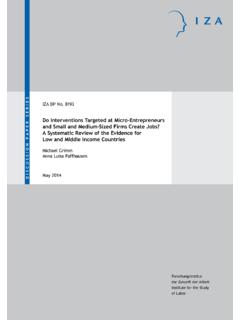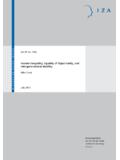Transcription of The Impact of Local Decentralization on Economic …
1 DISCUSSION PAPER SERIESF orschungsinstitut zur Zukunft der ArbeitInstitute for the Study of Labor The Impact of Local Decentralization onEconomic growth : evidence from CountiesIZA DP No. 4574 November 2009 George W. HammondMehmet S. Tosun The Impact of Local Decentralization on Economic growth : evidence from Counties George W. Hammond West Virginia University Mehmet S. Tosun University of Nevada, Reno and IZA Discussion Paper No. 4574 November 2009 IZA Box 7240 53072 Bonn Germany Phone: +49-228-3894-0 Fax: +49-228-3894-180 E-mail: Any opinions expressed here are those of the author(s) and not those of IZA. Research published in this series may include views on policy, but the institute itself takes no institutional policy positions.
2 The Institute for the Study of Labor (IZA) in Bonn is a Local and virtual international research center and a place of communication between science, politics and business. IZA is an independent nonprofit organization supported by Deutsche Post Foundation. The center is associated with the University of Bonn and offers a stimulating research environment through its international network, workshops and conferences, data service, project support, research visits and doctoral program. IZA engages in (i) original and internationally competitive research in all fields of labor economics, (ii) development of policy concepts, and (iii) dissemination of research results and concepts to the interested public.
3 IZA Discussion Papers often represent preliminary work and are circulated to encourage discussion. Citation of such a paper should account for its provisional character. A revised version may be available directly from the author. IZA Discussion Paper No. 4574 November 2009 ABSTRACT The Impact of Local Decentralization on Economic growth : evidence from Counties We analyze the Impact of fiscal Decentralization on county population, employment, and real income growth . Our findings suggest that government organization matters for Local Economic growth , but that the impacts vary by government unit and by Economic indicator. We find that single-purpose governments per square mile have a positive Impact on metropolitan population and employment growth , but no significant Impact on nonmetropolitan counties.
4 In contrast, the fragmentation of general-purpose governments per capita has a negative Impact on employment and population growth in nonmetropolitan counties. Our results suggest that Local government Decentralization matters differently for metropolitan and nonmetropolitan counties. JEL Classification: E62, H7, R11 Keywords: fiscal Decentralization , metropolitan, nonmetropolitan, population, employment, income, spatial econometrics Corresponding author: George W. Hammond Bureau of Business and Economic Research College of Business and Economics West Virginia University Morgantown, WV 26506-6025 USA E-mail: 11. INTRODUCTION Countries around the world, particularly transition economies, have gone through a significant Decentralization of their government structures in recent decades.
5 Decentralization is generally defined as the transfer of certain administrative and fiscal functions or powers of a central authority to several Local authorities. The main advantage of Local Decentralization is that Local governments are more efficient (or at least as efficient) at providing certain public services compared to the higher levels of government (Oates, 1972). On the other hand, the theoretical literature in this area argues that there are limits to Decentralization and points to an optimal level of fiscal federalism. Some of the limiting factors are listed as tax-benefit linkages, positive spillovers (externalities) of Local public goods to neighboring communities and economies of scale involved with the production of the Local public good.
6 For example, there is thought to be a trade-off between better treatment of positive externalities through a centralized decision making and loss of Local accountability (Oates, 2008). Arguments for the benefits of Decentralization and certain empirical evidence led to a widespread Decentralization trend particularly among transition economies. While the is generally more decentralized compared to most of the developed countries and the OECD average, there is a distinct trend towards more centralization in the states since 1970 (NCSL, 1997; Brunori, 2003).1 The main culprit for this trend is the diminished reliance on property taxes in Local financing. There is also a recent movement towards consolidation of certain types of Local governments.
7 A recent example of this is the recent merger between the city of Louisville and Jefferson County in Kentucky which was approved in a referendum in 2000. There are also talks about 2possible mergers or public service consolidations in Pittsburgh-Allegheny County (Pennsylvania), Reno-Sparks (Nevada), Buffalo and other locations in upstate New York. Similar consolidations were proposed in West Virginia after recommendations by the West Virginia Commission on Governing in the 21st Century. These different Decentralization trends highlight the importance of examining empirically the links between Decentralization and certain Economic outcomes, particularly Economic growth . In this paper, we examine the relationship between Local Decentralization and growth using data from metropolitan and nonmetropolitan counties in the In contrast to the previous literature that has focused on metropolitan statistical areas, we use counties as our geographic unit of analysis.
8 This is important, since counties (and lower levels of government) are often the governmental units with the power to fragment or centralize, either in terms of the number of government units or in terms of revenue generation. This contrasts with metropolitan statistical areas, which usually do not conform to political jurisdictions. We argue that it is important to include nonmetropolitan counties in the analysis since, as Hammond and Thompson (2008) and Higgins et al. (2006) have shown, metropolitan and nonmetropolitan regions differ significantly in their responses to growth determinants. Thus, including nonmetropolitan counties is important in order to avoid selection bias in the results and policy implications. We also add to the literature by examining multiple dimensions of county fiscal Decentralization , including fragmentation measures for both general-purpose and single-purpose governments, county revenue structure, as well as a measure of Local home rule 3power.
9 We also consider the Impact of fiscal Decentralization on county employment, in addition to population and real income, which is new in the literature. Finally, we incorporate important spatial relationships into our empirical analysis. We apply spatial econometric techniques (Anselin, 1988; Cliff and Ord, 1981) and as a result we control for important spillovers from county growth shocks. These spillovers may interfere with hypothesis testing, if not properly handled. Our results show that government organization matters for Local Economic growth . In addition, the impacts vary by type of government unit and by Economic indicator. For instance, we find that special-purpose governments have a significant Impact on population and employment growth , but not on income growth .
10 In contrast, we find that county revenue centralization has a significant Impact on income growth , but not on either population or income growth . These conflicting results across performance measures are similar to those encountered by Nelson and Foster (1999) and Foster (1993). Further, our results also highlight significant differences across metropolitan and nonmetropolitan counties, which is consistent with recent theoretical results in Brueckner (2006) and with the results reported in Lobao and Kraybill (2005). Indeed, we find that single-purpose governments more often Impact metropolitan growth than nonmetropolitan growth , while general-purpose governments Impact nonmetropolitan growth , in contrast to results for metropolitan counties.
